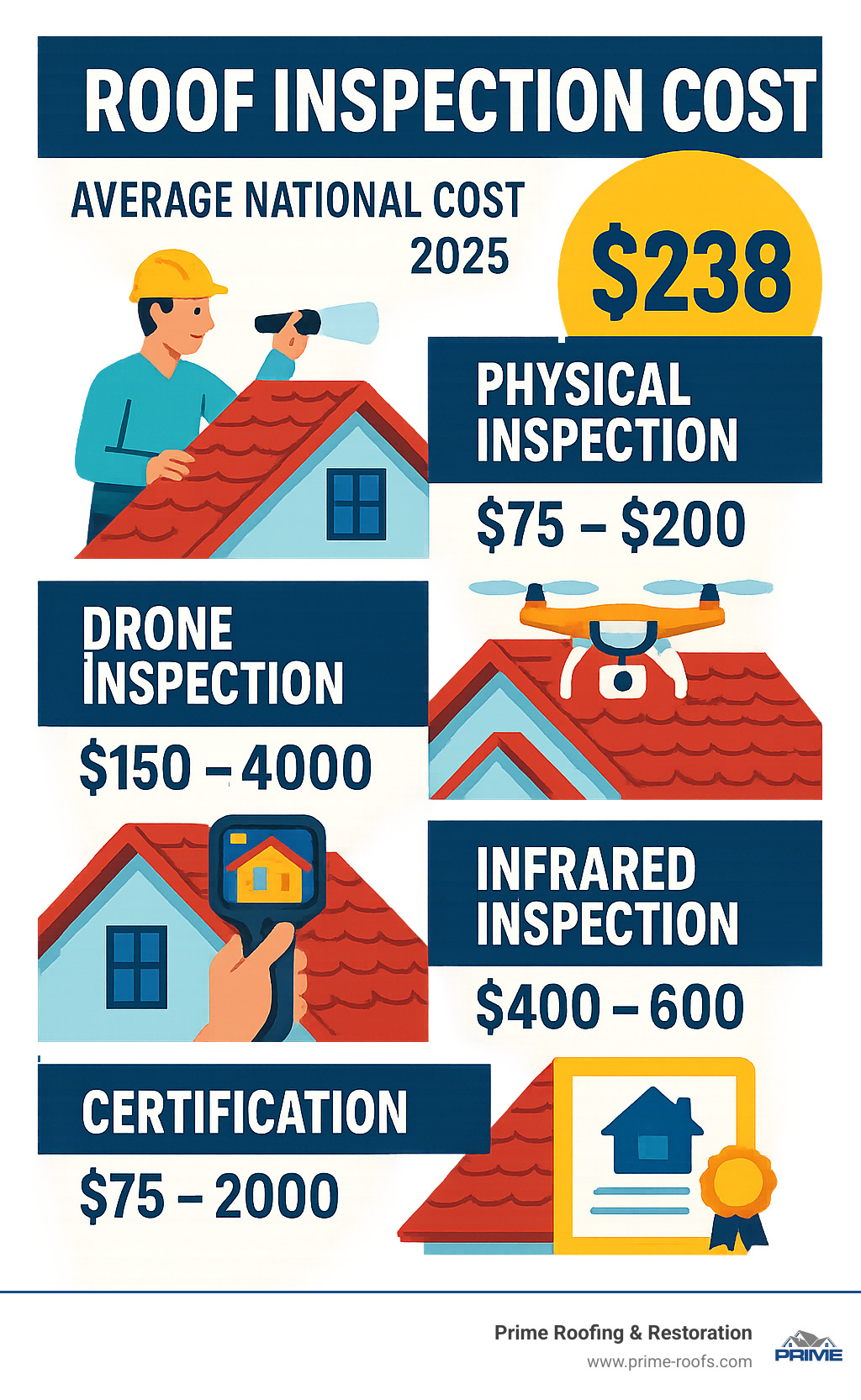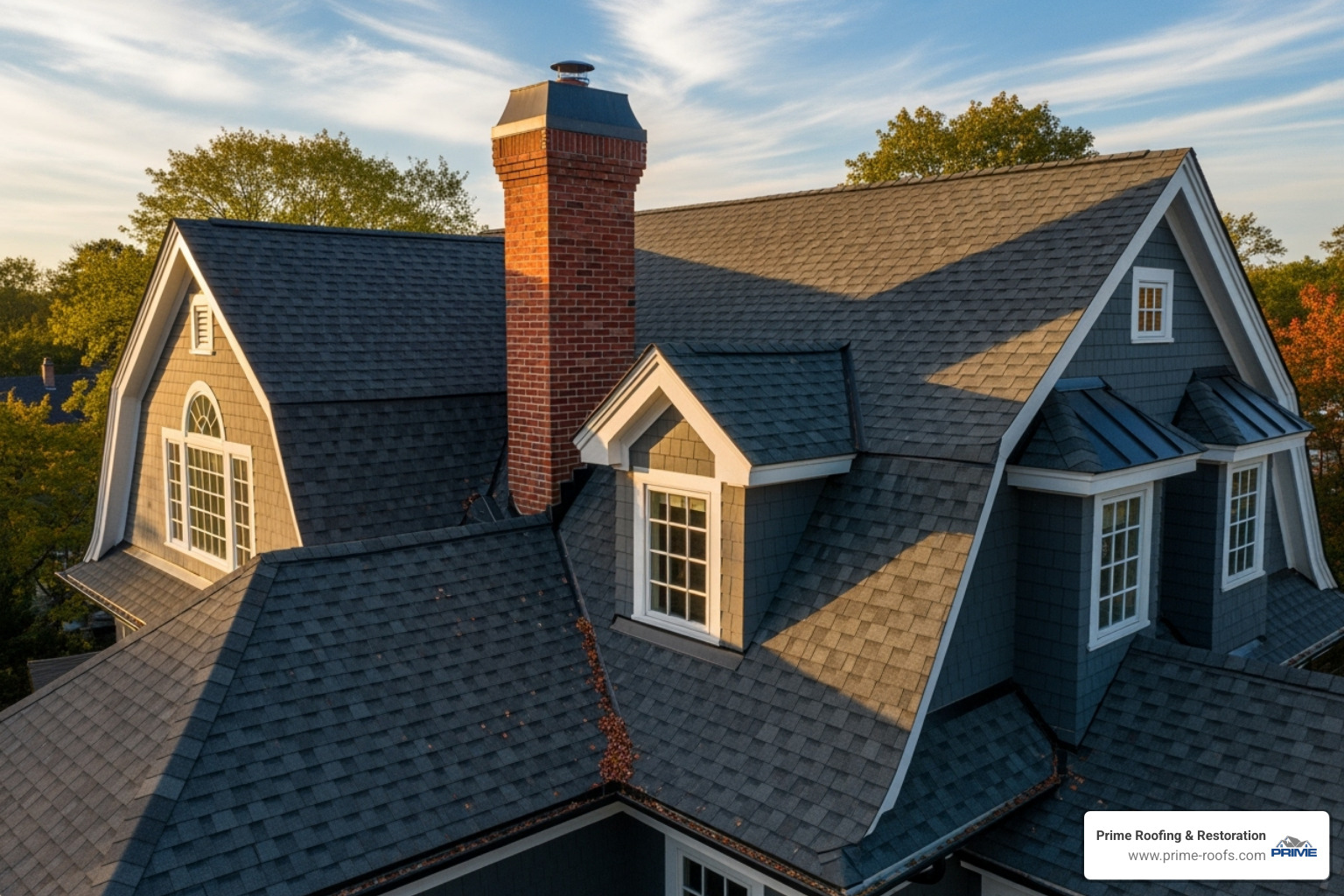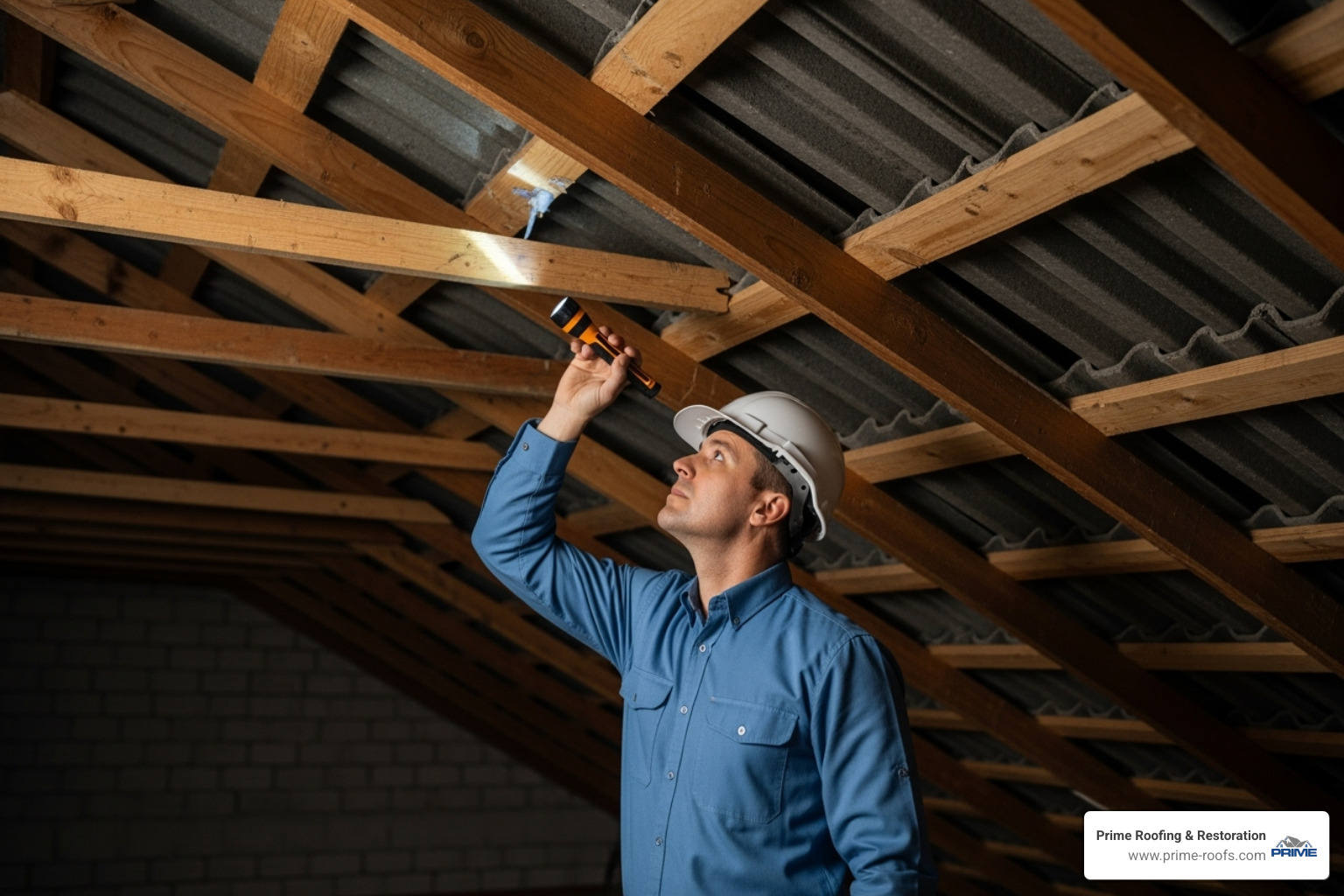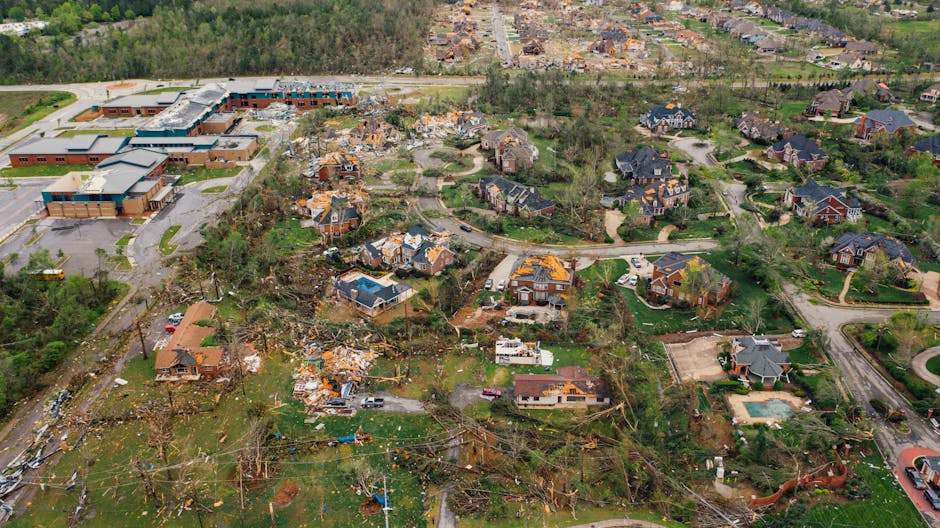Alabama Roof Inspection Cost (2025): Prices, Methods, and How to Save
The average roof inspection cost ranges from $125 to $361 (national average about $238), but your price can vary based on roof size, material, and inspection type. Your roof is the primary shield protecting your family from Alabama’s unpredictable weather, yet many homeowners delay check-ups until visible damage forces their hand. For expert guidance from a professional Alabama roofing company, start with our homepage for trusted roofing services: Alabama roofing company. If you need a detailed evaluation now, consider scheduling professional roof inspections. Delaying small fixes can turn affordable issues into major repairs.
Quick Cost Breakdown:
- Physical Inspection: $75 – $200
- Drone Inspection: $150 – $400
- Infrared Inspection: $400 – $600
- Roof Certification: $75 – $200
- National Average: $238
Investing in a regular roof inspection is one of the smartest decisions a homeowner can make. Research shows that proactive check-ups prevent small issues from escalating, potentially saving you thousands. A $200 inspection today could prevent a $15,000 roof replacement tomorrow. Whether you’re assessing storm damage, preparing to sell your home, or just seeking peace of mind, this guide will help you understand the costs and make informed decisions to protect your investment.

Breaking Down the National Average Roof Inspection Cost
A professional roof inspection is an affordable preventative measure, with the average homeowner spending between $125 and $361. However, specialized inspections using advanced technology will have a higher price tag. Understanding the different types and their associated costs helps you choose the right service for your needs.
What is the Average Roof Inspection Cost in 2025?
The roof inspection cost isn’t a single fixed price. For a general inspection, expect to pay between $120 and $400, with the national average around $238. However, depending on your roof’s complexity, size, and specific needs, the cost can range from $75 to over $950 for highly specialized services.
Let’s explore the different types of roof inspections and what they typically cost:
-
Standard Physical Inspection: This is the most common type, where a certified professional physically walks on your roof to examine its condition. This hands-on approach allows for a thorough assessment of shingles, flashing, and other components. The average cost is $75 to $200.
-
Drone Roof Inspection: For roofs that are steep, tall, or otherwise difficult to access safely, drones provide a great alternative. They capture high-resolution images for a detailed overview without setting foot on the roof, minimizing risk. Drone inspections typically range from $150 to $400.
-
Infrared Thermal Inspection: This advanced method uses thermal imaging to detect trapped moisture beneath the roofing surface that isn’t visible to the naked eye. It’s crucial for finding hidden leaks, especially on flat roofs. Infrared inspections cost around $400 to $600 due to the specialized equipment and expertise required.
-
Roof Certification Letter: Often required for real estate transactions or insurance purposes, a roof certification is a document from a certified inspector detailing the roof’s condition and estimated remaining lifespan. This service costs between $75 and $200. It is an expert evaluation, not a warranty.
Add-On Services and Their Costs
An inspection may reveal issues that require additional services. Here are common add-ons:
-
Attic Inspection: Checking the attic for poor ventilation, insulation issues, moisture, or water stains is key to diagnosing roof problems. An attic inspection can cost between $200 and $500.
-
Minor Roof Repairs: If the inspection finds small issues like a few missing shingles or damaged flashing, these can often be repaired. Minor roof repairs can range from $400 to $1,800, preventing small problems from becoming large ones.
-
Full Roof Replacement: If an inspection reveals widespread damage or that the roof has reached the end of its lifespan, a full replacement may be necessary. While the inspection is a small fee, it can lead to this significant investment, which averages $9,000 or more.
5 Key Factors That Influence Your Inspection Price
Not all roofs are created equal, and several factors can affect the final price of your inspection. Inspectors adjust their quotes to reflect the complexity, risk, and time required for a thorough evaluation.

The roof inspection cost depends on these key factors:
- Roof Size: Larger roofs require more time to inspect, which increases the cost. A 4,000 sq. ft. roof will naturally cost more to inspect than a 1,000 sq. ft. one.
- Roof Material: The material impacts the complexity and safety of the inspection. Asphalt shingles are straightforward to inspect. Metal roofs require more attention to seams and fasteners. Slate and tile roofs are fragile and require extreme care, which can significantly increase the inspection cost.
- Roof Accessibility & Slope: A steep-pitched roof or one with many dormers, chimneys, and skylights is more difficult and dangerous to steer than a low-slope, easily walkable roof. This complexity requires extra safety equipment and time, raising the price.
- Geographic Location: Labor costs and regional market conditions affect pricing. In Alabama, inspections account for local weather patterns and building codes.
- Extent of Damage: If you suspect significant damage or multiple leaks, the inspector will need more time to perform a detailed investigation to identify all problem areas, which can affect the final cost.
[TABLE] Roof Inspection Cost by Square Footage
| Roof Size (sq. ft.) | Average Cost Range |
|---|---|
| 1,000 | $75 – $210 |
| 2,000 | $150 – $420 |
| 3,000 | $225 – $630 |
| 3,500+ | $265 – $735+ |
How Roof Material and Slope Affect the Price
The material and pitch of your roof are two of the biggest cost drivers.
- Asphalt Shingles: As the most common material, these are the easiest and typically cheapest to inspect.
- Metal Roofing: These roofs are durable but can be slippery. Inspectors must carefully check seams and fasteners, which takes more time.
- Slate or Tile Roofs: These are extremely fragile and expensive. Inspectors must move slowly and may use specialized equipment to avoid cracking tiles, driving up the cost significantly.
- Low-Slope/Flat Roofs: While easy to walk on, these roofs are prone to hidden moisture issues, often requiring a more expensive infrared inspection.
- Steep-Pitch Roofs: Safety is the main concern here. Harnesses and other safety gear are required, slowing down the inspection and increasing the cost. A drone inspection may be a safer and more cost-effective option.
What’s Included in a Professional Roof Inspection?
When you hire a professional, you’re paying for their expertise and a comprehensive evaluation of your entire roofing system. A standard inspection covers four key areas, from the shingles on the exterior to the decking in your attic, ensuring no potential issue is overlooked. A detailed report provides you with actionable insights into your roof’s health.

A quality inspection can take from 45 minutes to several hours, depending on the roof’s size and complexity. It involves a systematic evaluation of the exterior, interior, structure, and workmanship to identify your roof’s current health and future needs. Some of the most telling signs of roof problems appear inside the attic, which is why a thorough inspection covers more than just the rooftop.
[LIST] The Inspector’s 4-Point Checklist
A methodical inspection process leaves no stone unturned. Here’s what a comprehensive check includes:
-
Structural Check: The inspector examines the fascia, soffits, and gutters for signs of rot, damage, or sagging. A sagging roofline can be a warning sign of serious structural issues with the underlying roof deck or supports.
-
Material Check: This involves a close-up examination of the roofing materials. The inspector looks for common signs of aging or storm damage, such as loose, missing, or curling shingles. For asphalt roofs, granule loss is a key indicator of wear. Flashing around chimneys, vents, and valleys is also checked for rust or gaps.
-
Interior Check: The inspection moves inside to the attic. Here, the inspector searches for signs of leaks like water stains or mold, as well as issues with ventilation or insulation. Poor ventilation can trap heat and moisture, drastically reducing a roof’s lifespan.
-
Workmanship Check: The quality of the roof’s installation and any past repairs are evaluated. Improperly sealed vents, chimneys, and skylights are common sources of leaks. The inspector assesses whether flashing and other components were installed correctly to prevent premature failure.
After the inspection, you receive a detailed report with photos and clear recommendations, giving you a roadmap for maintaining your roof.
Why Regular Inspections Are a Smart Investment
Skipping a routine inspection to save money is a gamble that can lead to catastrophic expenses. According to the National Roof Certification and Inspection Association (NRCIA), the number one cause of roof issues is deferred maintenance. Regular check-ups are crucial for catching small problems before they escalate.
A professional has the expertise to spot subtle issues you might miss from the ground, like granule loss or failing flashing. They also have the proper safety equipment to steer steep or fragile roofs without causing damage or risking injury.
Other key benefits of professional inspections include:
- Warranty Compliance: Most roofing material warranties require periodic professional inspections to remain valid.
- Insurance Claims: A recent inspection report provides crucial documentation of your roof’s pre-storm condition, which can help ensure a fair and smooth claims process.
- Real Estate Transactions: For buyers and sellers, an inspection provides peace of mind and prevents last-minute surprises that could derail a sale.
How Often Should You Inspect Your Roof?
- Annually: An annual check-up, ideally in mild weather, is the standard recommendation to catch routine wear and tear.
- After Major Storms: High winds, hail, and heavy rain can cause hidden damage. A post-storm inspection is critical to identify and address these issues promptly.
- Based on Age: As a roof ages, especially after the 15-year mark, it may benefit from semi-annual inspections to monitor its condition more closely.
How to Save Money on Your Roof Inspection Cost
- Bundle with Repairs: Many roofers offer a complimentary inspection if you’re already getting a quote for repairs.
- Schedule During the Off-Season: You may find better rates and availability during late fall or winter when demand is lower.
- Ask About Group Discounts: If neighbors also need inspections, scheduling them together can sometimes lead to a group discount.
- Choose a Transparent Roofer: When choosing a roofer, look for one with transparent pricing. Get multiple quotes and compare what’s included to ensure you’re getting the best value, not just the lowest price. Proactive roof maintenance like cleaning gutters can also help, but it doesn’t replace a professional evaluation.
Frequently Asked Questions about Roof Inspection Costs
Homeowners often have questions about the roof inspection cost and process. Here are answers to the most common inquiries.
How long does a roof inspection take?
A standard residential roof inspection typically takes between 45 minutes and 2 hours. The exact time depends on the roof’s size, complexity (e.g., steep slopes, multiple dormers), accessibility, and the type of inspection. An infrared inspection, for example, will take longer than a standard visual one.
Is a roof inspection different from a home inspection?
Yes, they are very different. A general home inspector provides a brief, visual overview of the roof as part of a whole-house assessment. A dedicated roof inspection is performed by a certified roofing specialist who conducts a much more detailed and in-depth examination of the entire roofing system, materials, and underlying structure. They can identify subtle issues and provide an accurate assessment of the roof’s remaining lifespan.
What happens if the inspection finds damage?
If an inspection uncovers damage, you will receive a comprehensive report detailing the findings. This report includes:
- High-quality photos of any problem areas.
- A clear explanation of the type and severity of the damage.
- Recommendations for necessary actions, whether it’s a simple repair or addressing one of the 5 signs you need roof replacement.
- A realistic cost estimate for any proposed work.
A reputable inspector provides this information without pressure, empowering you to make an informed decision for your home and budget.
Protect Your Home with a Professional Roof Assessment
The roof inspection cost is a small price for the security and knowledge it provides. Investing in a regular, professional assessment is a proactive step to extend your roof’s lifespan, prevent costly damage, and protect your home’s value. Don’t wait for a leak to tell you there’s a problem.

An annual inspection costing $125 to $361 is a minor investment compared to an emergency repair or a premature roof replacement, which can cost $9,000 or more. Regular inspections give you peace of mind and a clear understanding of your roof’s condition, allowing you to budget for future maintenance instead of reacting to a crisis.
If you are looking for expert roofers in the Alabaster, AL area, the licensed professionals at Prime Roofing & Restoration can help. We offer comprehensive evaluations and end-to-end solutions to protect your home and family. Call us today for a free estimate!
Prime Roofing & Restoration
Address: 5 Brown Cir, Alabaster, AL 35007
Phone: (205) 661-8190
